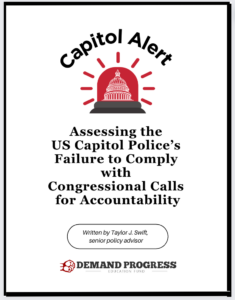The team behind the First Branch Forecast is proud to announce a new destination for our work and this newsletter: We’re joining forces with our friends at POPVOX Foundation.
After a brief hiatus, the First Branch Forecast will return to your inbox, but from a new address, so please check your promotions and spam folders — or better yet, would you please proactively add [email protected] to your contacts so you don’t miss an edition?
Our new alliance is a natural progression from coalitions and work we’ve collaborated on dating back nearly 15 years. Daniel and Gab from Demand Progress Education Fund first found common cause with POPVOX Foundation CEO Marci Harris when she was a congressional staffer with a plan to revamp constituent engagement systems and Daniel and Gab helped usher in a new era of civic tech and open data while at the Sunlight Foundation.
Since then, we’ve worked together to bring members and their staff up to speed on AI and emerging technology, to inform and promote smart legislative reforms that have improved congressional capacity and made Congress a more fair and diverse workplace, and to cultivate the next generation of congressional leadership through initiatives like Internapalooza.
Fast forward to today, and we’re thrilled to continue and expand upon our collaboration and to share our fact-based and nonpartisan policy recommendations to build a more effective government.
The First Branch team departs Demand Progress Education Fund/Demand Progress Action with gratitude and pride for our work together. We will miss our colleagues and have deep respect for their work and dedication to protecting our democracy, keeping the internet free, and combating unwarranted surveillance. We look forward to working in coalition as partners for years to come.
The whole is greater than the sum of its parts. We know our efforts will be more powerful and impactful, together with you — our dedicated readers, allies, and partners.
Thank you for your continued support. If you enjoy the First Branch Forecast, we’d be honored if you shared it with colleagues and encourage them to subscribe.

